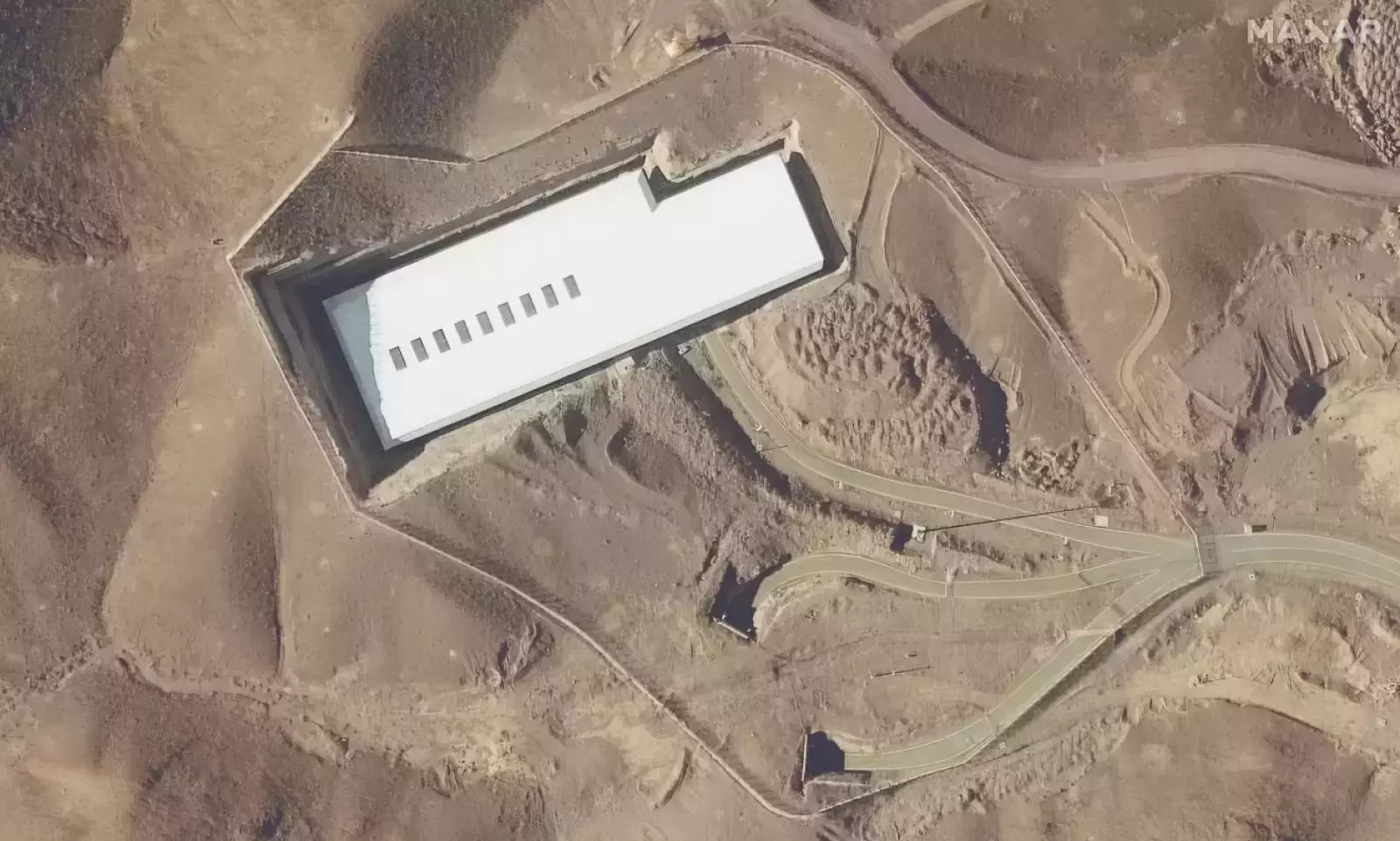
Trump says US strikes 3 Iranian nuclear sites, joins Israeli offensive
text_fieldsSatellite image of Iran’s Fordow nuclear site, January 24, 2025.
Washington: President Donald Trump announced that the United States has carried out airstrikes on three nuclear facilities in Iran, marking a significant escalation as Washington joins Israel's ongoing campaign to dismantle Tehran’s nuclear programme. The military operation targeted the heavily fortified underground sites at Fordow, Natanz, and Esfahan, according to Trump’s statement, and involved American B-2 stealth bombers delivering a full payload of bombs, including bunker busters capable of penetrating deep into reinforced targets.
The airstrikes, which Trump called “very successful,” represent the United States’ first direct military involvement in the Israeli-led operation that began over a week ago. Israel has focused on disabling Iran’s air defences, missile systems, and nuclear enrichment infrastructure. The United States’ participation, utilising advanced weaponry exclusive to its military, appears aimed at ensuring the destruction of targets Israel could not strike on its own.
“All planes are now outside of Iranian airspace,” Trump posted on social media on Saturday. “A full payload of BOMBS was dropped on the primary site, Fordow. All planes are safely on their way home.”
In a follow-up post, Trump wrote:
“This is an HISTORIC MOMENT FOR THE UNITED STATES OF AMERICA, ISRAEL, AND THE WORLD. IRAN MUST NOW AGREE TO END THIS WAR. THANK YOU!”
Trump added that he would address the nation at 10:00 p.m. Eastern Time.
Iran’s nuclear agency on Sunday confirmed that the sites at Fordow, Natanz, and Esfahan had come under attack. The admission came amid soaring tensions, as Tehran had repeatedly warned that any direct U.S. involvement in the conflict would provoke a severe response. Iranian Supreme Leader Ayatollah Ali Khamenei had earlier warned that strikes on Iran would cause “irreparable damage” to the United States, while Foreign Ministry spokesperson Esmail Baghaei declared that “any American intervention would be a recipe for an all-out war in the region.”
Despite these warnings, Trump appears to have decided that the timing was right. Officials said Israeli operations had already softened Iran’s defences, creating a rare opportunity to inflict lasting damage on its nuclear programme. B-2 bombers were the only aircraft capable of carrying and deploying the 30,000-pound (13,500 kg) GBU-57 A/B Massive Ordnance Penetrator — a non-nuclear bomb specifically designed to destroy deeply buried targets. These weapons, dropped in succession, can burrow through layers of rock and concrete before exploding, making them the only viable means of hitting Iran’s most secure nuclear facilities.
The decision marks a striking departure for Trump, who won the presidency promising to avoid entangling the United States in foreign wars. On Friday, he reiterated that he had no intention of deploying ground troops, calling such a move “the last thing you want to do.” Nonetheless, under pressure from Israeli leaders and Republican lawmakers, Trump authorised airstrikes just two days after telling reporters he would take two weeks to make a decision.
The International Atomic Energy Agency (IAEA) has confirmed Iran’s enrichment of highly concentrated uranium at Fordow, raising concerns that bombing the facility could release nuclear material. Previous Israeli strikes at Natanz resulted in contamination only within the facility, according to the IAEA.
Iranian Foreign Minister Hossein Amir-Abdollahian had warned before the U.S. strike that American involvement would be “very, very dangerous for everyone.” Meanwhile, Houthi rebels in Yemen — backed by Tehran — have threatened to resume attacks on American vessels in the Red Sea, which had been paused since May under a temporary agreement with the U.S.
In a sign of the escalating regional threat, the U.S. ambassador to Israel announced the start of “assisted departure flights” for American citizens from Israel — the first since the October 7, 2023, Hamas-led assault that ignited the Gaza war.
The Pentagon and White House have not yet offered further details on the operation. But Israeli officials said their campaign has already weakened Iran’s ability to defend itself from aerial attacks, significantly degrading nuclear and missile capabilities. Still, it was understood that only the U.S. could deliver the kind of bunker-busting strike required to take out Fordow.
Trump had previously attempted a diplomatic solution, pursuing two months of high-level negotiations with Iran in hopes of securing an agreement to scale back its nuclear programme. He twice convinced Israeli Prime Minister Benjamin Netanyahu to delay planned attacks — first in April and again in May — while diplomatic channels remained open. However, those talks ultimately failed, and Trump's tone shifted dramatically from urging peace to issuing threats of military retaliation and unconditional surrender.
“We know exactly where the so-called Supreme Leader is hiding,” Trump wrote on social media. “He is an easy target, but is safe there — We are not going to take him out (kill!), at least not for now.”
The airstrike comes seven years after Trump withdrew the United States from the 2015 nuclear agreement negotiated under the Obama administration. That deal, signed by Iran, the U.S., and other world powers, placed strict limits on Iran’s uranium enrichment in exchange for the lifting of economic sanctions. Trump had long criticised the deal as weak and one-sided, arguing it failed to curb Iran’s broader regional aggression.
While the military campaign could severely damage Iran’s nuclear ambitions, it also raises the prospect of a broader war across the Middle East. Israeli forces are reportedly preparing for a prolonged conflict, and Iran’s regional allies are threatening to act. Meanwhile, Trump has come under criticism from some of his conservative base — including commentator Tucker Carlson — for breaking his promise to avoid overseas entanglements.
Nevertheless, with the attacks underway and tensions at a boiling point, Trump has fully committed to a high-stakes strategy that could shape the future of U.S. foreign policy and stability across the region.
With PTI inputs


















